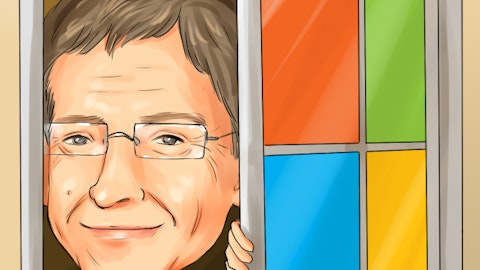The meteoric rise of Nokia Corporation (ADR) (NYSE:NOK) in the years leading up to catastrophic bursting of the tech bubble was breathtaking. The company’s shares went from trading in the $2-$3 range to scraping $60. Nokia Corporation (ADR) (NYSE:NOK) practically overnight became a corporate superpower, sporting a market cap of $250 billion at its peak in 2000. Nokia Corporation (ADR) (NYSE:NOK) was thriving in 2000, when according to the research group Gartner Dataquest, Nokia Corporation (ADR) (NYSE:NOK) held a leading 30.6% market share of the mobile phone market, which was 17.3 percentage points more than the second-place Motorola held .
Even as Nokia Corporation (ADR) (NYSE:NOK) dealt with the severe backlash of the bursting of the infamous tech bubble in 2000 and 2001, its core business remained strong. As late as 2007 the company held a dominant position in mobile device industry, with a 40% share in the handset market.
The bigger they are the harder they fall
In 2007, Nokia Corporation (ADR) (NYSE:NOK) still held onto a valuation over $150 billion. Then the empire began to collapse. The dramatic rise of Nokia was almost as shocking as its fall . Along with the rest of the market, Nokia’s stock fell in 2008, however unlike the broader market, never recovered. Over the following years the company’s market share withered away, while its stock price plummeted. Now in 2013 Nokia shares trade at roughly $5, and carry a valuation of a meagerly $19 billion.
The fat lady starts to sing
On Sep. 3, Nokia agreed to sell its main handset business to Microsoft Corporation (NASDAQ:MSFT) for $7.2 billion. The seeds of this deal were planted two years ago, when Nokia made the controversial decision to use Microsoft Corporation (NASDAQ:MSFT)’s Windows Phone software for smartphones, opposed to Nokia’s own software or Google Inc (NASDAQ:GOOG)‘s Android operating system.
This deal, which includes an agreement to license Nokia’s patent portfolio for 10 years, will bring 32,000 of Nokia’s 90,000 employees to Microsoft, and leaves Nokia with its networking equipment unit, navigation business, and technology patents.
Microsoft pushes into mobile
Why did Microsoft Corporation (NASDAQ:MSFT) acquire this troubled business? Many see this as a continued attempt by the company to push further into the fast-growing mobile industry. While Microsoft’s own Surface tablet has sold sluggishly since its launch last year, Nokia’s Lumia series have helped in boosting Windows Phone’s market share in the global smartphone industry to 3.3%, surpassing BlackBerry Ltd (NASDAQ:BBRY) for the first time this year.
Under the past deal between Nokia and Microsoft, Microsoft got less than $10 per phone in software royalties. Now, since Microsoft owns the software side of the product as well as the hardware side, Microsoft stands to make roughly $40 per phone sold.






